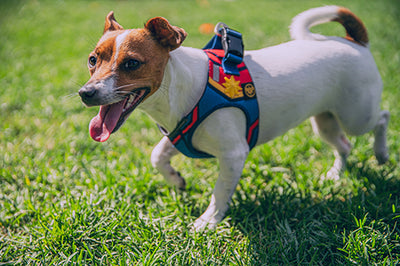What are allergies? An allergic reaction is one in which an individual reacts to a normal substance in the environment. These substances are called allergens and include pollens, mould, animal hair, house dust, fleas, foods and many more. Allergens cause reactions through skin contact, inhalation or ingestion. Allergic animals possess IgE antibodies to the specific allergens. These antibodies cause biochemical changes in the body which produce allergy symptoms.
How does an animal show signs of allergy? While the causes of allergies in humans and animals are the same, the clinical signs displayed may differ. In humans the classic signs of allergy are nasal and respiratory. In animals however, it is far more common to show signs of skin irritations with intense itching. Cats often show more signs of respiratory distress (as in humans) than dogs.
The classic signs of an allergic animal begin with scratching, feet licking and chewing and face rubbing. As the allergies become more severe, the chewing may eventually lead to bacterial skin infections and large open sores. Food allergies can also cause skin problems, although it is not uncommon for them to cause vomiting and diarrhoea.

Why are my pet’s symptoms worse some times than others? Allergens are cumulative in their effect on animals. The more allergens an animal is exposed to at any one time increases the chance of allergy symptoms, as well as the extent of the reaction. The easiest way to picture this “threshold” phenomenon is to think of drops of water in a bucket, sooner or later the bucket will overflow, much as the immune system “overflows” beyond it’s threshold. For this reason, time of a symptom’s onset is not necessarily an indication of what the animal is allergic to. An animal with food and pollen allergies may only show symptoms in the summer (pollen count at its highest) because the pollens push it over the threshold.
How can I have my pet’s allergies diagnosed? After a thorough examination, your veterinarian will decide if allergy testing is indicated for your pet. Having ruled out other possible causes, a small sample of blood may be drawn and submitted to Spectrum Veterinary for diagnostic evaluation. There, your pet’s serum will be tested for sensitivity to inhalants such as pollens from trees, grasses, weeds and shrubs, fungi, house dust and mites, as well as for a host of food types used as ingredients in commercial dog and cat food preparations.
What about treatment for my pet’s allergies? The best form of treatment for allergies is avoidance of the offending allergen/s. In most cases, however, this is not possible. Steroid drugs are often used for short-term relief of symptoms, but prolonged use of steroids can have serious side effects and never really addresses the root cause of allergies. Hyposensitisation is another alternative and can be formulated into allergy injections or allergy drops depending on the patient’s needs and what your veterinarian feels is best. Regardless of which option you choose, treatment sets are formulated specifically for your pet based on its allergy test results. The treatment builds up your pet’s tolerance to the offending allergens so it can live more comfortably in its environment, without the worry of side effects. Please note: Apoquel and Cytopoint, while used to address allergy symptoms should not be confused with allergy treatment.
How effective is this form of treatment? Some allergy symptoms dissipate with time and treatment. In other cases animals may require continued allergy treatment to maintain tolerance to the allergens in question. With adherence to the treatment schedule, one can expect an excellent chance of elimination of or reduced dependence on steroid drugs. Improvement in most cases is seen after 3-5 months of treatment.
What about food allergies? Since cats cannot be hyposensitised to foods, elimination is the only form of treatment in the case of food allergies. Should your pet test positive to foods, Spectrum Veterinary will supply your veterinarian with a list of commercially available foods free from the ingredients to which your pet tested positive.
When would I see allergy symptoms in my pet? This depends on the cause of the animal’s allergy problems. If it has an allergy to pollens you might see all or more symptoms in the spring or summer. If, however, it has a problem with indoor substances, such as house dust or mites, or food related allergies, you are more likely to see year round allergies.
My pet is currently on Apoquel™ or Cytopoint™, why do I still need to proceed with testing/treatment? Apoquel & Cytopoint are anti-itch tools developed to provide short-term relief and can be used in conjunction with hyposensitisation. Anti-itch medicines relieve the immediate itch while treatment builds tolerance to the offending allergens. Allergen-specific hyposensitisation remains the safest option for the core treatment of atopy.
Spectrum Allergy Testing is currently available at Pet First Veterinary Clinic






